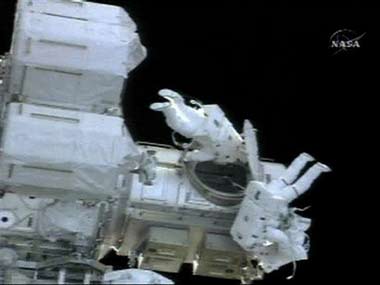
In this image made from NASA TV, astronaut
Mike Fossum, left, and astronaut Piers Sellers, right with stripes, enter
the Quest airlock after a spacewalk Saturday, July 8, 2006.
[AP] |
A key test of a daring yet wobbly spacewalking technique that could be used
someday to repair space shuttle heat shields worked well Saturday and got good
reviews from two astronauts from the shuttle Discovery, NASA officials said.
The repair simulation put them at the end of an oscillating, 100-foot
combination of a robotic arm and an extension pole that astronaut Piers Sellers
said made him feel "like a bug on the end of a fishing rod here."
In a 7 1/2-hour spacewalk, the first of three orbital excursions planned for
this mission, Sellers and Michael Fossum said they could do most of the mock
tasks they were assigned with only moderate difficulty.
And that's what NASA wanted to hear.
"It was above and beyond" what engineers expected, flight director Tony
Ceccacci said after the spacewalk ended. "Hopefully, we'll never have to use it
(the boom for repairs) but we know we have the capability."
The technique using the extension on the robotic arm was developed to make
sure there is never a repeat of the Columbia disaster, which killed seven
astronauts in 2003. A piece of foam from the shuttle's external fuel tank struck
Columbia's wing during launch, creating a breach that allowed fiery gases to
penetrate the shuttle during the return flight to Earth.
Last year, emergency spacewalking repairs were needed because of heat shield
damage to Discovery.

The space shuttle
Discovery heads into space as it blasts off for Mission STS-121 at the
Kennedy Space Center in Cape Canaveral, Florida, July 4, 2006.
[Reuters] |
Fossum and Sellers may get a chance to use the boom for a real repair on
their third spacewalk, now scheduled for next Wednesday. NASA managers on
Saturday were still evaluating whether a piece of fabric filler protruding from
the thermal tiles on Discovery's belly needs to be removed. If it does, Fossum
and Sellers would have to go back on the boom and yank out the filler.
Orbiter project manager Steve Poulos said a decision will be made Sunday on
whether this gap filler, which is cracked, partially broken and just a couple
inches at its longest point, must be removed. The early consensus is that it
probably will be all right the way it is for re-entry, but engineers will pull
an all-nighter to recommend what, if anything, needs to be done, he said.
Every other possible worry with the space shuttle heat shield has proven to
be no big deal, deputy shuttle program manager John Shannon said. On Sunday,
NASA may say Discovery is safe to land, he said, noting that Discovery's flight
has "by far" the fewest problems he has ever seen.
NASA officials had been concerned that astronauts wouldn't be able to work
well from the 50-foot extension boom attached to the similar-sized shuttle
robotic arm. The agency's top spacewalk officer had compared it to painting a
house from the top of a rickety ladder.
But as Fossum and Sellers were finishing up Saturday, NASA officials said
they found less sway and oscillating than expected.
Fossum said one simulated operation was "beyond my ability" and "too much
motion to handle" from the boom. But another way of doing the same job worked
well, so that's not a concern, lead spacewalking officer Tomas Gonzalez-Torres
said. Aside from that operation, however, the worst Fossum reported was one he
rated a 5 on a 1-to-10 scale, which translates to doable but with "moderately
objectionable deficiencies."
"I think we got all we needed there," Discovery pilot Mark Kelly told Fossum
and Sellers after the simulation.
During Sellers' time on the boom-arm combo, he remarked as he was being moved
into position that the ride was "a very slow gentle sway in and out of the bay."
Before their work on the boom-arm combo, the astronauts had an assignment on
the outside of the space station, immobilizing a cable cutter on the station's
mobile transporter, or railroad car, and rerouting a cable through it. A
duplicate cable cutter accidentally cut a cable leading to the transporter late
last year, and NASA wanted to make sure it doesn't happen again because the
cable is a conduit for power, data and video images.
The transporter moves along the space station exterior and is used for
constructing the complex. The severed cable will be replaced during a second
spacewalk set for Monday.
The two astronauts also managed to enjoy themselves on the spacewalk which
lasted an hour longer than normal because of glitches with tethers. At one point
while waiting for Fossum, Sellers did a couple of flips. Both let out frequent
"woo-hoos" during their time in space.
The also had time to marvel at the view from 210 miles above Earth.
"It's beautiful," Fossum said. "The thin glow of the moonlit Earth below."
And when Mission Control pointed out to Sellers that he could view Britain
over his left shoulder, the British-born spacewalker said: "Wow! Oh, my
goodness. It's a beautiful day in Ireland."
Looking down at the Caspian Sea several minutes later, Fossum said: "This is
a good view ... I'm in a dream; nobody wake me up."